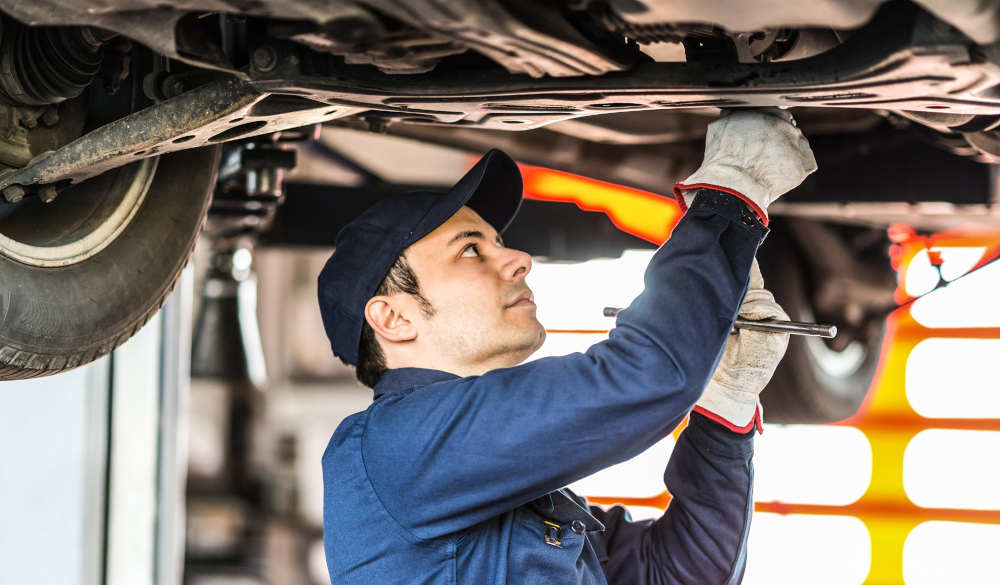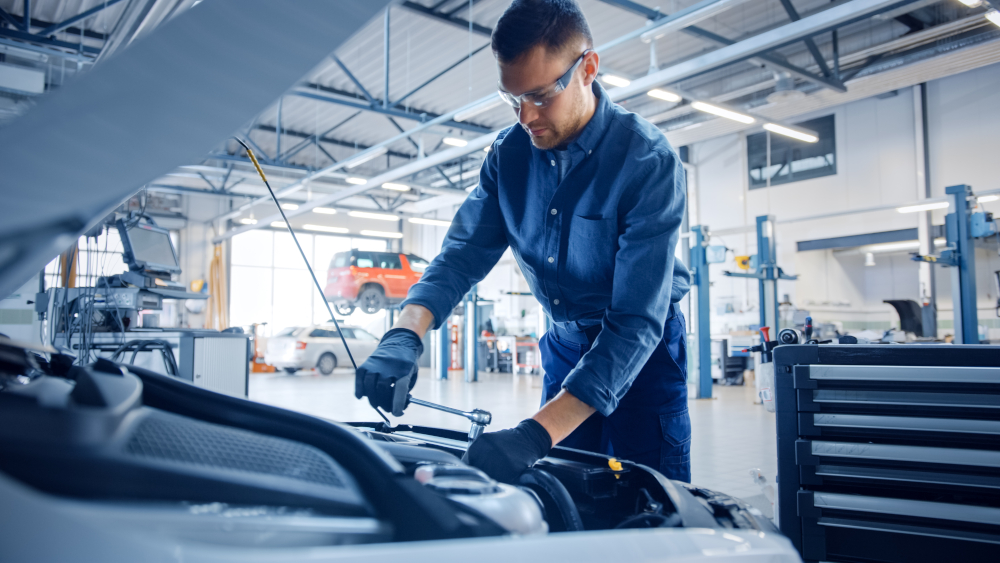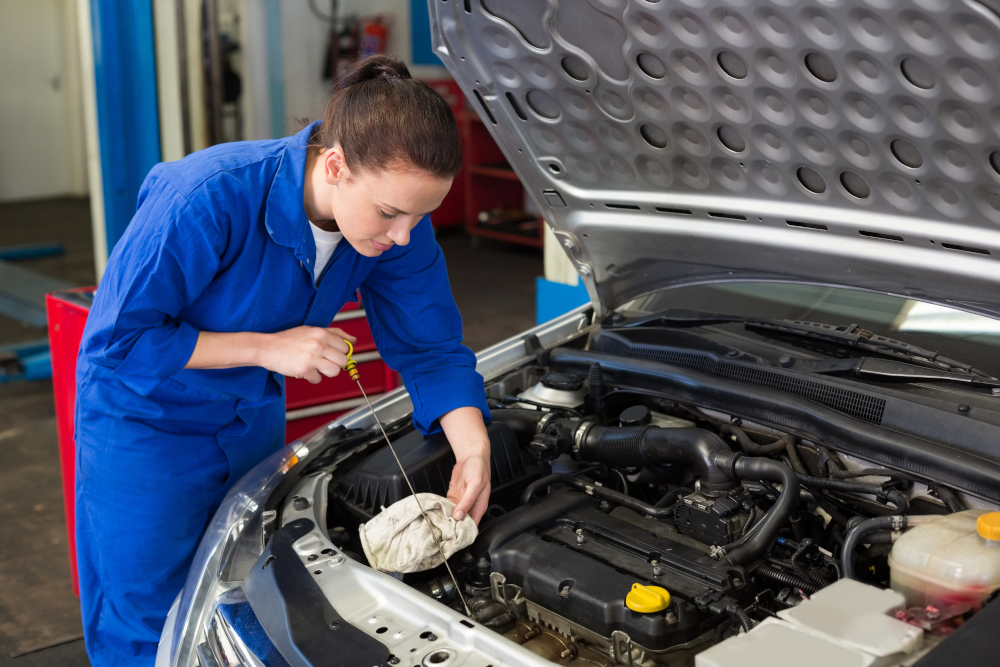Car mechanics are the unsung heroes behind the scenes, ensuring vehicles run smoothly and safely. Yet, the profession can take a toll on your physical and mental health if you don't pay attention to self-care.
In this guide, we'll delve deeper into tips to help professional car mechanics stay healthy, enabling them to enjoy a fulfilling and long-lasting career.

Lifting heavy car parts and equipment is an integral part of a mechanic's daily routine. Failing to execute these tasks with proper lifting techniques can result in debilitating back and muscle injuries. Here's an expanded look at mastering these techniques:
1. Bend Your Knees
When approaching an object to lift, bend your knees instead of your waist. This engages your leg muscles, which are far better equipped to handle heavy loads than your back muscles.
2. Maintain a Straight Back
Keeping your back straight while lifting is crucial to prevent strains and injuries. Leaning forward or rounding your back increases the stress on your spine.
3. Use the Power of Your Legs
The strength in your legs is your greatest asset when lifting. Push through your legs to lift the object while keeping your back straight.
4. Secure Your Grip
Ensure you have a firm and secure grip on the object you're lifting. Gloves with proper grip can help prevent accidents caused by objects slipping from your hands.
5. Keep It Close
Keep the object as close to your body as possible. This minimises the strain on your back and enhances your control over the load.
6. Pivot with Your Feet
Instead of twisting your torso when changing the direction of the load, pivot with your feet. Twisting can strain your back and lead to injuries over time.
By consistently implementing these techniques, mechanics can safeguard themselves against common lifting-related injuries, allowing them to maintain their physical well-being throughout their careers.

Crafting an ergonomic workspace is essential for the long-term health of mechanics. Here's a more detailed exploration of creating an ergonomic environment:
1. Adjustable Workbenches and Chairs
Invest in workbenches and chairs that are adjustable to accommodate different tasks and body sizes. An adjustable chair with proper lumbar support can significantly reduce back strain.
2. Tool Organisation
Arrange your tools systematically, placing frequently used items within easy reach. This minimises the need for awkward stretches and prevents repetitive strain injuries.
3. Proper Lighting
Ensure your workspace is well-lit to reduce eye strain and prevent accidents caused by poor visibility.
4. Anti-Fatigue Mats
Consider using anti-fatigue mats in areas where you stand for extended periods. These mats reduce the pressure on your feet and legs.
5. Monitor Placement
Position computer monitors and screens at eye level to maintain a neutral neck position. This helps prevent neck and shoulder discomfort.
6. Breaks and Posture Checks
Take regular breaks to stand up, stretch, and adjust your posture. Use these moments to relax and reset your body.
Creating an ergonomic workspace not only enhances comfort but also mitigates the risk of developing musculoskeletal problems that can affect your quality of life.
Personal Protective Equipment (PPE) is your armour against the potential hazards of your workplace. Let's delve deeper into how PPE can safeguard your health:
1. Safety Glasses
Safety glasses protect your eyes from flying debris, sparks, and chemicals. Opt for glasses with side shields for comprehensive coverage.
2. Gloves
Wearing gloves shields your hands from sharp objects, chemicals, and excessive friction. Choose gloves designed for your specific tasks.
3. Ear Protection
Exposure to loud machinery and tools can lead to hearing damage over time. Use ear protection, such as earmuffs or earplugs, to safeguard your hearing.
4. Respiratory Protection
Depending on the task, invest in high-quality respiratory protection. Dust masks, respirators, or supplied air systems protect against harmful fumes, dust, or chemicals.
By consistently using the appropriate PPE for each task, you significantly reduce the risk of injuries and long-term health issues related to your work environment.

Proper ventilation is a critical component of maintaining a healthy and safe work environment for car mechanics. Here's a more comprehensive look at how prioritising proper ventilation can protect your well-being:
1. Harmful Exhaust Fumes:
The combustion of fuels in vehicles produces harmful exhaust gases, including carbon monoxide (CO). Continuous exposure to CO can lead to severe health issues, including headaches, dizziness, and even carbon monoxide poisoning. Effective ventilation systems, such as exhaust fans and vehicle exhaust extraction systems, should be in place to remove these fumes promptly.
2. Dust and Airborne Particles:
The process of working on cars can generate significant amounts of dust and airborne particles. This debris can be hazardous when inhaled, potentially leading to respiratory problems, such as allergies and bronchitis. Air filtration systems, including dust collectors and high-efficiency particulate air (HEPA) filters, can effectively capture and remove these particles from the air.
3. Proper Garage Ventilation:
Adequate garage ventilation ensures that fresh air circulates within the workspace, diluting and dispersing harmful airborne substances. Natural ventilation through windows and doors, combined with mechanical ventilation systems like exhaust fans and air exchange units, helps maintain clean and safe air quality.
4. Regular Maintenance:
Regular maintenance of ventilation systems is crucial to their effectiveness. Dust and debris can accumulate in exhaust fans and filters, reducing their efficiency. Schedule routine inspections and cleanings to ensure these systems are operating optimally.
5. Air Quality Monitoring:
Consider implementing air quality monitoring systems to continuously assess the air quality in your workspace. These systems can provide real-time data and trigger alarms if air quality deteriorates, allowing for immediate action.
By prioritising proper ventilation and adhering to maintenance schedules, car mechanics can significantly reduce their exposure to harmful pollutants, ensuring a healthier and safer workplace.
Dehydration is a common concern in the physically demanding environment of a garage. Here's an expanded perspective on why staying hydrated is crucial for car mechanics:
1. Physical Demands: The nature of mechanical work requires significant physical exertion, leading to increased sweating. When you sweat, your body loses essential fluids, which must be replenished by drinking water. Failure to do so can lead to dehydration, characterised by symptoms such as dizziness, fatigue, and reduced physical performance.
2. Cognitive Function: Dehydration not only affects your physical performance but also impairs cognitive function. Lack of proper hydration can lead to reduced concentration, memory problems, and diminished decision-making abilities. In a job that demands attention to detail and problem-solving, maintaining mental sharpness is paramount.
3. Temperature Regulation: Adequate hydration helps regulate your body temperature. Working in a garage with high ambient temperatures can lead to excessive sweating, which, when combined with insufficient hydration, can result in heat-related illnesses such as heat exhaustion or heatstroke.
4. Preventing Muscle Cramps: Dehydration can contribute to muscle cramps, which can be particularly debilitating when you need to maintain precise movements and positions while working on vehicles.
5. Short Breaks: Make it a habit to take short breaks throughout the day to drink water. Keep a water bottle within arm's reach to remind yourself to hydrate regularly. It's often more effective to sip water steadily rather than trying to catch up on hydration all at once.
By prioritising regular hydration and recognising its importance for both physical and cognitive function, car mechanics can maintain their overall health and job performance.

Nutrition plays a vital role in sustaining the energy levels and overall health of car mechanics. Here's a more comprehensive perspective on how to fuel your body with healthy nutrition:
1. Balanced Diet:
Prioritise a balanced diet that includes a variety of foods from different food groups. Incorporate fruits, vegetables, lean proteins (such as chicken, fish, and beans), whole grains (like brown rice and whole wheat bread), and healthy fats (such as avocados and nuts) into your meals.
2. Energy Stability:
Consuming a balanced diet helps stabilise your energy levels throughout the day. Avoid excessive consumption of sugary snacks and high-caffeine beverages, as they can lead to energy crashes and disrupt your work performance.
3. Nutrient Density:
Choose nutrient-dense foods that provide essential vitamins and minerals. These foods not only support your physical well-being but also contribute to your mental alertness and overall vitality.
4. Meal Planning:
Plan your meals and snacks in advance. Packing a nutritious lunch and healthy snacks can help you resist the temptation of fast food or vending machine options when you're busy at work.
5. Avoid Excessive Fast Food:
While it may be convenient, frequent consumption of fast food can lead to weight gain, increased cholesterol levels, and other health issues. Limit fast food intake and reserve it for occasional treats.
6. Hydration Through Food:
Remember that some foods, like fruits and vegetables, have high water content and contribute to your overall hydration. Incorporate these into your diet to complement your water intake.
By fueling your body with healthy nutrition, you'll not only have the energy and stamina required for your physically demanding job but also promote long-term health and well-being. Your diet plays a crucial role in your overall performance and resilience as a car mechanic.
Being a car mechanic is both a physically demanding and rewarding profession. By following these in-depth tips for prioritising your health, you can minimise workplace risks, protect your well-being, and enjoy a long and satisfying career in the automotive industry.
Remember, your health is your greatest asset, and investing in it will serve you well throughout your journey as a dedicated car mechanic.
Be the first to post comment!